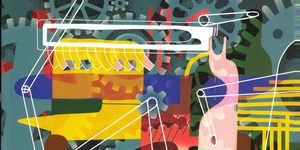Review: HOTHOUSE at Grand Théâtre
The play approaches the themes of corruption, abuse of power, bureaucratic incompetence and surveillance.

This weekend, the Grand Théâtre opened its door to Harold Pinter's Hothouse, the celebrated black comedy made famous in the 1980s. The play's dark tone and down spiraling narrative contrasts notoriously with many of its absurd dialogues and uplifting comedic moments, resulting in a remarkable and disconcerting fusion. It tells us the story of an institution vaguely dedicated to mental health, where the staff is rather ambiguous about the purpose of this mysterious facility. While terms like sanatorium and rest house are used to define it, patients are referred to by their number, and everything in the setting and atmosphere screams of prison.
The play approaches the themes of corruption, abuse of power, bureaucratic incompetence and surveillance. These concepts are further cemented through the impressive layout of the stage, where most of the audience is strategically placed at the center of the action, surrounded by the corridors and divisions where the action takes place.
It is here that we meet Root (Dennis Kozeluh), the director of the institution, a former army officer turned warden, who at this stage seems to struggle with the most basic tasks of his job. He is told on Christmas day that one of the inmates has recently passed away, while a second one has given birth. The handling of the situation displays how little any figure of authority cares for patients, or even for staff members that are not directly connected to the spheres of power. The widely incompetent Root is assisted by Gibbs (Daron Yates), an ambitious and disciplined employee, Lush (Marie Jung), an alcoholic worker that is not afraid to tell it as it is and Miss Cutts (Céline Camara), Root's mistress. It is heavily hinted that the father of the newborn is one of the main characters, which is why Gibbs decides to pin the recent misfortunes on Lamb (Danny Boland), a blue-collar worker who ends up viciously mistreated.
The gold: The setting. The story was good, the acting was great, but the setting managed to greatly enhance the virtues that this play and cast had to offer. We have now covered over 50 events in Luxembourg and this might have been one of the most immersive layouts we have seen so far. You were not watching, you were there, imprisoned in your own way. The claustrophobic tone of the first floor was reinforced by the somber cells of the second, and even the smallest props added to the Orwellian mood.
The silver: Dennis Kozeluh. Kozeluh played the character with all the layers of incompetence and arrogance required, while continuously giving off a harmless Jack Torrance vibe. This was not only a great performance, but also one that showcased the play's dichotomy between comedy and tragedy.
The bronze: A very close call, but we're going with Marie Jung. While it was a bit hard to tell what Lush was all about in the moments when the character was drunk, Jung delivered some of the most memorable lines in the show. Very intense short monologues and subtle mannerisms really left a mark in the narrative and in the general atmosphere. While Yates and Boland were also great, the first did not have a lot of room for versatility, due to the nature of his character, and the second was just not long enough on stage.
Suggestion box: Volume and accents. The layout of the audience was fantastic, but this made it harder for the cast to be consistently heard by everyone in some specific occasions. Also, a general thought - there is nothing wrong with your normal accent. Camara made sure to stick to her own, and this made her performance more charming, fluid and unique than it would have otherwise been.
As always, our thanks to the Grand Theátre, to director Anne Simon and to everyone involved for a great night.
To reach out to the writer: nuno.de.sousa.lopes@gmail.com
Image credit: Grand Théatre
Reader Reviews

Videos

